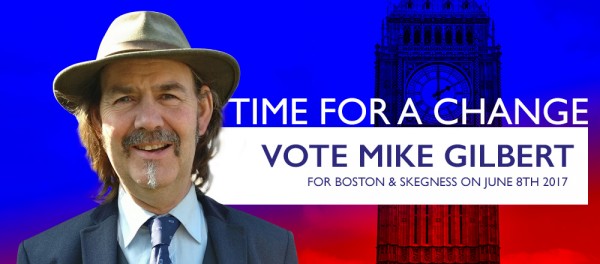Britain's smallest parties: Meet A Blue Revolution
A party for “those who contribute either socially or economically but receive little in return” is standing in Lincolnshire.

A party aiming to give “blue collar workers” more representation is hoping to sway voters in Boston and Skegness.
We spoke to Mike Gilbert, 56, nominating officer and sole parliamentary candidate for A Blue Revolution, about the party’s beginnings and policies.
What does A Blue Revolution stand for?
A Blue Revolution
A Blue Revolution. 22 likes. A new political franchise started in March 2017. Our aim is to get ordinary people into politics without the need to struggle through a party system. Download our…
A Blue Revolution calls itself a “party for blue collar workers and those who contribute either socially or economically but receive little in return”.
The party promises it would not rely upon debt to boost the economy and that a Blue Revolution government would stay out of social and economic activities.
Policies are based on the idea that “nothing is given or received unless it is contracted for, freely chosen and consented to” – for example, parents would be required to sign a contract committing to being responsible for the child they are having before birth.
“There is a yawning gap between what people want and what politicians give them,” said Gilbert. “We have an 18th-century military and legal system, a 19th-century political and to some extent education system, and a 20th-century welfare and health system.
“These systems don’t work for ordinary people who pay more and more for them and people know it but can’t articulate why. We see ourselves as the people who articulate the people’s concerns.”
When was it set up?
The party is brand new, beginning the formal process of becoming a party in December 2016 and being recognised by the Electoral Commission in March 2017 with a view to fielding multiple candidates in the scheduled 2020 election.
Gilbert said that due to the late notice of the election, the party was unable to field more than one candidate: himself.
He will be standing in Boston and Skegness, the constituency he has lived in for 25 years, serving as a Conservative local councillor between 2011 and 2015.
Gilbert said: “We managed to secure 20 names on our nomination paper from supporters, however we have not had time to market the party and whilst we do have members we have decided not to take money as we don’t have membership cards.
“The election campaign caught us by surprise, fundraising and membership will start after the election.”
What role do smaller parties play in Britain’s democracy?
“Our Parliament, I believe, finds small parties anachronistic, so there really is no place for us aside from ensuring that votes shift between the main parties, with some to us, and this supports the two-party parliamentary status quo.”
Gilbert acknowledges the success of Ukip, saying: “They did shift the national debate on a single issue and delivered change.
“However, they never managed to get more than one MP and that was an ex-Tory. They are now heading towards extinction.”
Gilbert says smaller parties could do better with changes to the electoral system. “We do think the parliamentary system needs to be made more democratic so it can accommodate the input of smaller parties who reflect more minority interests.”





